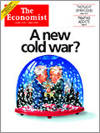
Economist, April 17
(posted Friday, April 16, 1999)
The cover story worries that the Kosovo crisis could refreeze relations between Russia and NATO. Russia is so eager to reassert its authority that it may "gamble away its standing in the democratic world in support of a regime that has committed the most heinous human-rights abuses in modern Europe." ... Another editorial charts the sinking status of the refugee. During the Cold War era, Western countries viewed asylum as a symbolic triumph over the Soviet empire, but refugees displaced by recent ethnic conflicts are finding no havens. ... The magazine profiles Serbian filmmakers. The most talented of the lot, a man who just released a penetrating movie about war and moral decay, is now negotiating a deal to direct costume dramas and love stories for Miramax.
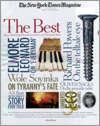
New York Times Magazine, April 18
(posted Thursday, April 15, 1999)
The first of six special millennium issues picks "The Best Ideas, Stories and Inventions" of the past 1,000 years. The introduction defends the concept of ranking (it cuts through late 20th-century "data smog," and besides other magazines do it too). Leon Botstein deems the human voice Best Musical Instrument, and A.S. Byatt awards Scheherazade Best Story. Among the other winners: human rights for Best Idea; Celestine V for Best Pope; India for Best Revolution; penicillin for Best Invention; and Lucille Ball for Best Clown. The list is decidedly Brit-heavy, with citations for Elizabeth I (Best Leader), Henry VIII and Anne Boleyn (Best Sex Scandal), the purchase of the Suez Canal (Best Land Deal), and Adm. Nelson's victory over Napoleon at the Nile (Best Naval Battle).
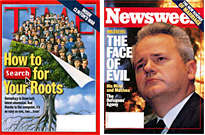
Time and Newsweek, April 19
(posted Tuesday, April 13, 1999)
Newsweek's cover story on Slobodan Milosevic, "The Face of Evil," recites the now familiar story of how he co-opted Serb nationalism to fuel his own rise to power. Time calls the Kosovo crisis "Clinton's War," but Newsweek suggests that Vice President Al Gore may eventually pay the price for it during the 2000 campaign. Gore has defended the bombing-only strategy so vehemently that he'll suffer if the president does send ground troops. Time prints a map of the world's ethnic and civil conflicts, color-coded to show the level of U.S. involvement, annotated with death tolls. A Newsweek sidebar reports that both the Serbs and the Kosovo Liberation Army have been trafficking in drugs to fund weapon purchases.
Time's cover story on the amateur genealogy trend sweeping the nation points would-be researchers to the National Archives, Internet databases, and prison records. The most avid practitioners are Mormons, who believe that ancestors can be saved through posthumous baptism and have established 3,200 genealogy libraries around the world to encourage conversions.
Newsweek features the findings of a psychologist who claims he can predict with 90 percent accuracy whether a marriage will endure or dissolve. The piece includes a handy quiz for couples who want to diagnose their viability. (Yes or no: "My partner generally likes my personality.")

U.S. News & World Report, April 19
(posted Tuesday, April 13, 1999)
The cover story debates whether NATO's goal should be to carve up Kosovo or administer it as a protectorate. A caustic piece reports that war has improved life in Belgrade: There are no traffic jams (because so many people have fled), and the crime rate has dropped (because all offenses are tried under martial law). ... A profile says Bill Bradley may be the slumbering giant of the presidential race. He's raising cash fast and his once-derided brainy folksiness is earning praise.
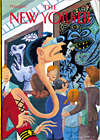
The New Yorker, April 19
(posted Tuesday, April 13, 1999)
A profile of the Ochs and Sulzberger families suggests that their stewardship of the New York Times was unduly influenced by self-consciousness about their Judaism. Arthur Sulzberger intentionally underplayed the paper's reports of Nazi exterminations. ... A long piece chronicles how a death row inmate from Arizona named Paris Carriger was exonerated with legal support from a small cadre of savvy East Coast friends. He didn't know any of them when sentenced, but he cultivated epistolary friendships from his prison cell with reporters, anti-capital punishment activists, and experts he saw featured on the MacNeil-Lehrer NewsHour. ... A New York chef reveals the nastiness inside upscale restaurant kitchens: old fish, grimy meat, and rivers of butter.
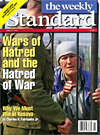
Weekly Standard, April 19
(posted Tuesday, April 13, 1999)
The editorial lauds hawkish Republicans for their willingness to send ground troops to Kosovo and berates poll-wary Democrats for their hesitance to do so. ("Why don't they just make Dick Morris the national security adviser and stop the charade?") ... A piece suggests that Americans are not as skittish about battle casualties as the conventional wisdom dictates: During the Gulf War, 84 percent of Americans backed the use of ground troops. ... The cover story likens Serbian ethnic cleansing to the practices of Nazi Germany. Both are a harsher expression of the same impulse that leads to "separate academic departments for African-American studies, women's studies, Jewish studies."